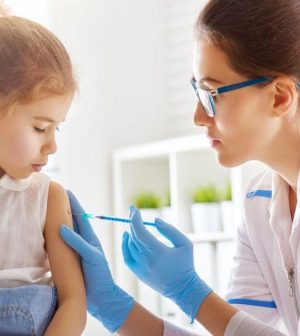- 10 Strategies to Overcome Insomnia
- Could Artificial Sweeteners Be Aging the Brain Faster?
- Techniques for Soothing Your Nervous System
- Does the Water in Your House Smell Funny? Here’s Why
- Can a Daily Dose of Apple Cider Vinegar Actually Aid Weight Loss?
- 6 Health Beverages That Can Actually Spike Your Blood Sugar
- Treatment Options for Social Anxiety Disorder
- Understanding the Connection Between Anxiety and Depression
- How Daily Prunes Can Influence Cholesterol and Inflammation
- When to Take B12 for Better Absorption and Energy
White House Announces COVID Vaccination Plan for Young Kids

The White House on Wednesday unveiled a national plan to roll out coronavirus vaccines for 5- to 11-year-olds that is designed to make getting shots as easy and comfortable as possible for both kids and their parents.
Rather than mass vaccination sites, the Biden administration plans to have pediatric COVID shots delivered in settings that parents know and trust.
“Nationwide, more than 25,000 pediatric and primary care provider sites will provide vaccinations for children, in addition to tens of thousands of other provider locations that serve children, including pharmacies, children’s hospitals, and community health centers,” a White House statement said.
According to Dr. Amesh Adalja, senior scholar at the Johns Hopkins Center for Health Security, in Baltimore, “The most significant aspect of this plan, to me, is the enlisting of pediatricians. When parents and children have a trusted source of information on the vaccine, it may reduce vaccine hesitancy since they will be able to ask questions of someone they have an existing relationship with. Indeed, this is something that should’ve been done — and still should be done — with adults.”
Even the doses of vaccine are expected to be geared towards kids.
The Pfizer pediatric vaccine awaiting approval by the U.S. Food and Drug Administration would involve a two-dose series of 10-microgram shots, about one-third of the dosage administered to adults and kids 12 or older.
“COVID has also disrupted our kids’ lives,” U.S. Surgeon General Dr. Vivek Murthy told NBC News on Wednesday. “It’s made school harder, it’s disrupted their ability to see friends and family, it’s made youth sports more challenging. Getting our kids vaccinated, we have the prospect of protecting them, but also getting all of those activities back that are so important to our children.”
An FDA advisory board meeting to authorize emergency use of the vaccine in this group of children is set for Oct. 26, and the U.S. Centers for Disease Control and Prevention’s advisors will weigh in on the vaccine on Nov. 2 to 3.
Wednesday’s announcement makes it clear that federal health officials will move fast once the Pfizer pediatric vaccine is approved.
“Our planning efforts mean that we will be ready to begin getting shots in arms in the days following a final CDC recommendation,” the White House statement said. “These steps will be critical in ensuring that we are staying ahead of the virus by keeping kids and families safe, especially those at highest risk.”
The Biden administration is hosting “operational readiness calls” with state and local leaders to make sure they are ready to distribute and administer pediatric vaccines once the green light is given, the White House statement said.
The federal government has bought enough vaccine to fully cover all 28 million kids aged 5 to 11, and it will be distributed in smaller packages of about 100 doses each to make things more manageable for doctors’ offices and community health centers, the White House added.
The U.S. Department of Health and Human Services will also conduct a national public education campaign to alleviate any concerns that parents and guardians might harbor about the safety of COVID-19 vaccines.
Two-thirds of U.S. parents of kids aged 5 to 11 plan to get their children vaccinated once the shots are approved, according to a recent poll by the COVID-19 Vaccine Education and Equity Project.
“While we’re encouraged to see that a majority of parents intend to vaccinate their children against COVID-19 once they are eligible, there is clearly more work to be done to help address parents’ questions and ease concerns about the vaccines,” said Beth Battaglino, CEO of HealthyWomen and an organizer with the COVID-19 Vaccine Education and Equity Project.
More information
Vaccines.gov has information on where you can get a COVID-19 vaccine.
SOURCES: White House, statement, Oct. 20, 2021; Amesh Adalja, senior scholar, Johns Hopkins Center for Health Security, Baltimore, Md.; NBC News
Source: HealthDay
Copyright © 2026 HealthDay. All rights reserved.










